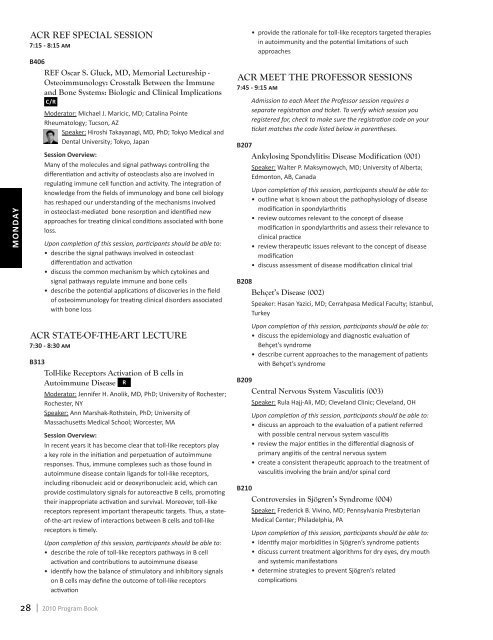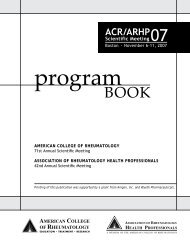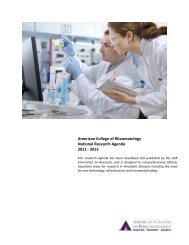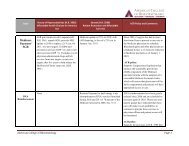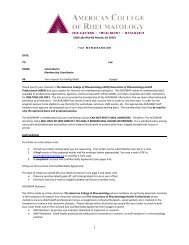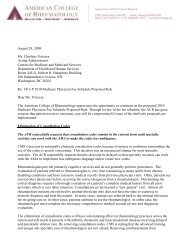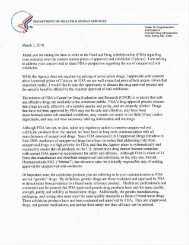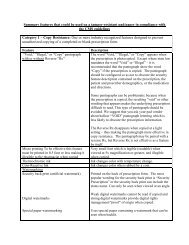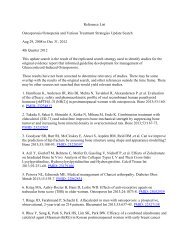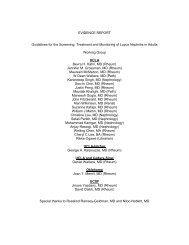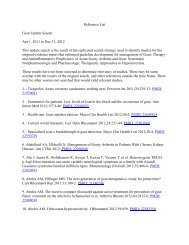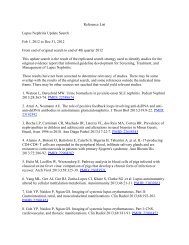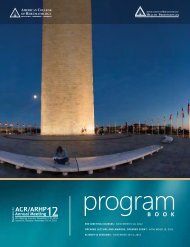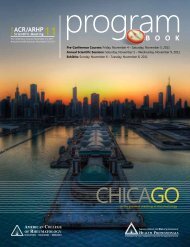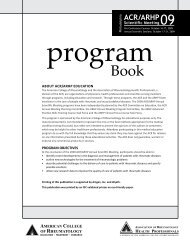B O O K - American College of Rheumatology
B O O K - American College of Rheumatology
B O O K - American College of Rheumatology
You also want an ePaper? Increase the reach of your titles
YUMPU automatically turns print PDFs into web optimized ePapers that Google loves.
monday<br />
ACR REF Special Session<br />
7:15 - 8:15 am<br />
B406<br />
REF Oscar S. Gluck, MD, Memorial Lectureship -<br />
Osteoimmunology: Crosstalk Between the Immune<br />
and Bone Systems: Biologic and Clinical Implications<br />
c/r<br />
Moderator: Michael J. Maricic, MD; Catalina Pointe<br />
<strong>Rheumatology</strong>; Tucson, AZ<br />
Speaker: Hiroshi Takayanagi, MD, PhD; Tokyo Medical and<br />
Dental University; Tokyo, Japan<br />
Session Overview:<br />
Many <strong>of</strong> the molecules and signal pathways controlling the<br />
differentiation and activity <strong>of</strong> osteoclasts also are involved in<br />
regulating immune cell function and activity. The integration <strong>of</strong><br />
knowledge from the fields <strong>of</strong> immunology and bone cell biology<br />
has reshaped our understanding <strong>of</strong> the mechanisms involved<br />
in osteoclast-mediated bone resorption and identified new<br />
approaches for treating clinical conditions associated with bone<br />
loss.<br />
Upon completion <strong>of</strong> this session, participants should be able to:<br />
• describe the signal pathways involved in osteoclast<br />
differentiation and activation<br />
• discuss the common mechanism by which cytokines and<br />
signal pathways regulate immune and bone cells<br />
• describe the potential applications <strong>of</strong> discoveries in the field<br />
<strong>of</strong> osteoimmunology for treating clinical disorders associated<br />
with bone loss<br />
ACR State-<strong>of</strong>-the-Art Lecture<br />
7:30 - 8:30 am<br />
B313<br />
Toll-like Receptors Activation <strong>of</strong> B cells in<br />
Autoimmune Disease R<br />
Moderator: Jennifer H. Anolik, MD, PhD; University <strong>of</strong> Rochester;<br />
Rochester, NY<br />
Speaker: Ann Marshak-Rothstein, PhD; University <strong>of</strong><br />
Massachusetts Medical School; Worcester, MA<br />
Session Overview:<br />
In recent years it has become clear that toll-like receptors play<br />
a key role in the initiation and perpetuation <strong>of</strong> autoimmune<br />
responses. Thus, immune complexes such as those found in<br />
autoimmune disease contain ligands for toll-like receptors,<br />
including ribonucleic acid or deoxyribonucleic acid, which can<br />
provide costimulatory signals for autoreactive B cells, promoting<br />
their inappropriate activation and survival. Moreover, toll-like<br />
receptors represent important therapeutic targets. Thus, a state<strong>of</strong>-the-art<br />
review <strong>of</strong> interactions between B cells and toll-like<br />
receptors is timely.<br />
Upon completion <strong>of</strong> this session, participants should be able to:<br />
• describe the role <strong>of</strong> toll-like receptors pathways in B cell<br />
activation and contributions to autoimmune disease<br />
• identify how the balance <strong>of</strong> stimulatory and inhibitory signals<br />
on B cells may define the outcome <strong>of</strong> toll-like receptors<br />
activation<br />
• provide the rationale for toll-like receptors targeted therapies<br />
in autoimmunity and the potential limitations <strong>of</strong> such<br />
approaches<br />
ACR Meet the Pr<strong>of</strong>essor Sessions<br />
7:45 - 9:15 am<br />
Admission to each Meet the Pr<strong>of</strong>essor session requires a<br />
separate registration and ticket. To verify which session you<br />
registered for, check to make sure the registration code on your<br />
ticket matches the code listed below in parentheses.<br />
B207<br />
Ankylosing Spondylitis: Disease Modification (001)<br />
Speaker: Walter P. Maksymowych, MD; University <strong>of</strong> Alberta;<br />
Edmonton, AB, Canada<br />
Upon completion <strong>of</strong> this session, participants should be able to:<br />
• outline what is known about the pathophysiology <strong>of</strong> disease<br />
modification in spondylarthritis<br />
• review outcomes relevant to the concept <strong>of</strong> disease<br />
modification in spondylarthritis and assess their relevance to<br />
clinical practice<br />
• review therapeutic issues relevant to the concept <strong>of</strong> disease<br />
modification<br />
• discuss assessment <strong>of</strong> disease modification clinical trial<br />
B208<br />
Behçet’s Disease (002)<br />
Speaker: Hasan Yazici, MD; Cerrahpasa Medical Faculty; Istanbul,<br />
Turkey<br />
Upon completion <strong>of</strong> this session, participants should be able to:<br />
• discuss the epidemiology and diagnostic evaluation <strong>of</strong><br />
Behçet’s syndrome<br />
• describe current approaches to the management <strong>of</strong> patients<br />
with Behçet’s syndrome<br />
B209<br />
Central Nervous System Vasculitis (003)<br />
Speaker: Rula Hajj-Ali, MD; Cleveland Clinic; Cleveland, OH<br />
Upon completion <strong>of</strong> this session, participants should be able to:<br />
• discuss an approach to the evaluation <strong>of</strong> a patient referred<br />
with possible central nervous system vasculitis<br />
• review the major entities in the differential diagnosis <strong>of</strong><br />
primary angiitis <strong>of</strong> the central nervous system<br />
• create a consistent therapeutic approach to the treatment <strong>of</strong><br />
vasculitis involving the brain and/or spinal cord<br />
B210<br />
Controversies in Sjögren’s Syndrome (004)<br />
Speaker: Frederick B. Vivino, MD; Pennsylvania Presbyterian<br />
Medical Center; Philadelphia, PA<br />
Upon completion <strong>of</strong> this session, participants should be able to:<br />
• identify major morbidities in Sjögren’s syndrome patients<br />
• discuss current treatment algorithms for dry eyes, dry mouth<br />
and systemic manifestations<br />
• determine strategies to prevent Sjögren’s related<br />
complications<br />
28<br />
2010 Program Book


